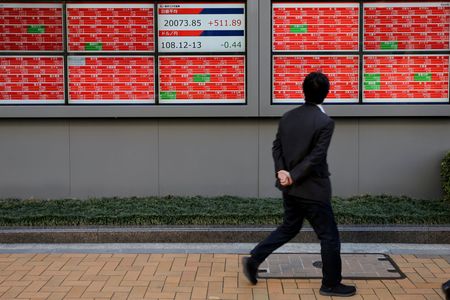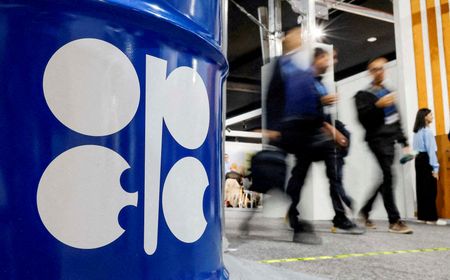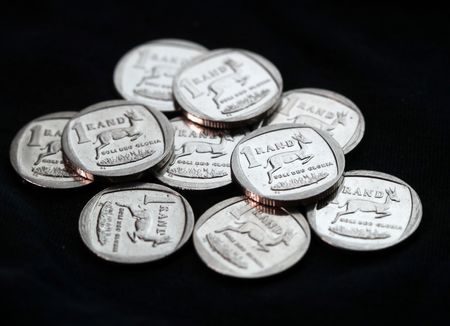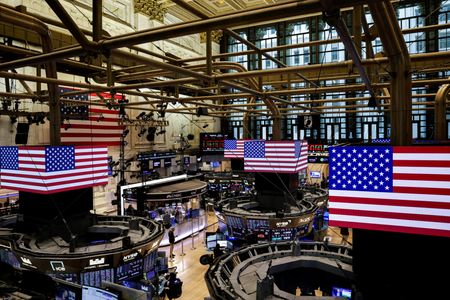By Amanda Cooper
LONDON (Reuters) -Global stocks rose on Monday, driven by investor optimism over a U.S.-China trade truce and surging investment in artificial intelligence, while the dollar hit three-month highs as expectations for hefty U.S. rate cuts began to wane.
Investors are still focused on developments from last week, including central bank meetings and the U.S.-China agreement on a year-long trade truce that was within broad expectations. But doubts remain if the truce will last for the full duration.
In Europe, the broad STOXX 600 share index rallied 0.4% in another heavy week for earnings, while the dollar gained and U.S. stock futures rose 0.3 to 0.5%.
Investors cannot rely on their usual economic touchstone in the first week of the month – the monthly U.S. jobs report – and instead will have to look at private-sector employment and at the labour components of surveys of business activity due this week.
“If it weren’t for the shutdown, we’d be looking forward to the U.S. jobs report for October on Friday. But given we aren’t getting the government data releases, there’s likely to be outsize attention on the ADP’s report of private payrolls on Wednesday, especially in light of Chair Powell’s hawkish press conference last week,” Deutsche Bank strategist Jim Reid said.
TIME FOR CAUTION?
The Federal Reserve last week cut interest rates as expected. But Chair Jerome Powell said another cut in December was “not a foregone conclusion”, contrary to investor belief that it was essentially a done deal.
The mood is still buoyant, as evidenced by robust stock markets, decent earnings and a pickup in the dollar, yet some analysts believe that a number of other positives, such as the trade truce between Washington and Beijing, may already be in the rear-view mirror.
In Asia, data showed big manufacturing hubs struggled to fire up in October as weak U.S. demand and tariffs under President Donald Trump hit factory orders across the region.
“We advise investors to lock in some gains on the rises and accumulate on the corrections, and rotate into more defensive positioning toward year-end,” BofA strategists said in a note.
HAWKISH FEDSPEAK
A clutch of Fed officials on Friday aired their discomfort with the U.S. central bank’s decision to cut interest rates, even as influential Fed Governor Christopher Waller made the case for more policy easing to shore up a weakening labour market.
Traders are now pricing a 68% chance of a rate cut in December, down from a near certainty last week before the Fed meeting, where the central bank lowered rates by 25 basis points.
The dollar has been clawing back this year’s losses over the past few weeks and is now down around 7.9% against a basket of six other currencies, compared with a year-to-date loss of closer to 11% in September. The dollar index posted a gain of 2% in October, its largest monthly increase since July.
On Monday, the euro was down 0.15% at $1.1516, around three-month lows, while sterling was down 0.4% at $1.312, ahead of a knife-edge Bank of England rate decision later this week. The yen weakened, leaving the dollar up 0.1% at 154.13 yen, near its highest since mid-February.
EARNINGS SEASON IN FOCUS
After a mixed bag of earnings from the megacap companies that showed investors were keen to see a return on the extensive capital spending on AI infrastructure, focus will be on the technology sector.
Semiconductor firm Advanced Micro Devices, Qualcomm and data analytics company Palantir Technologies report this week, along with Uber and fast-food chain McDonald’s.
In commodities, gold was back above $4,000, while Brent crude futures rose 0.32% to $64.98 a barrel, after OPEC+ decided to refrain from raising output in the first quarter of next year.
(Additional reporting by Ankur Banerjee in Singapore; Editing by Sonali Paul, Himani Sarkar and Emelia Sithole-Matarise)











